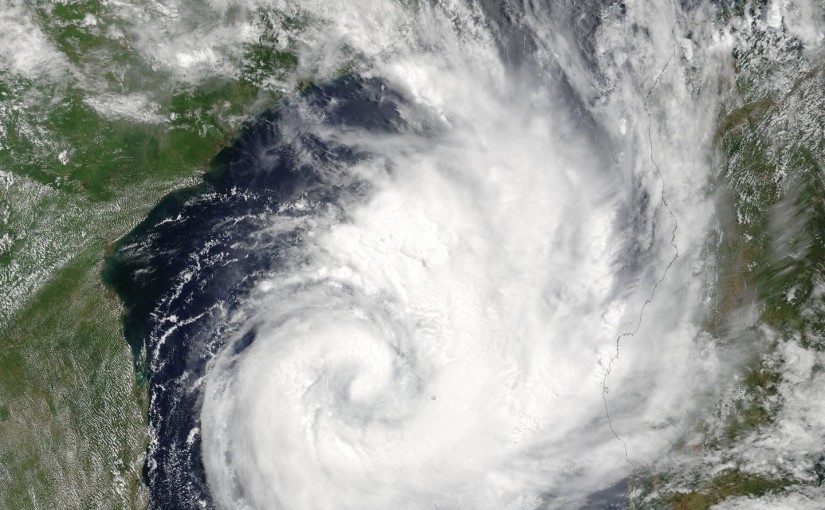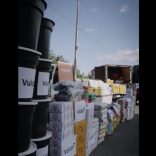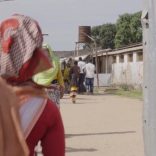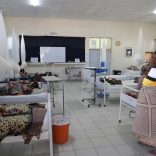Mozambique: Vulcan assists 30,000 affected by Cyclone Jude in Zambézia - Watch
Cyclone Preparedness Guide – #Dineo, Mozambique

NASA / NASA's Terra satellite captured this visible image of Tropical Cyclone Dineo in the Mozambique Channel on Feb. 14, 2017 at 2:45 a.m. EST (0745 UTC). Madagascar is to the east (right) and Mozambique lies to the west (left).
During cyclone season, it is recommended that people have the following emergency equipment on hand:
1. Emergency Lighting Equipment. Flashlights with spare batteries and bulbs or lanterns powered by batteries. Avoid using open flames (candles or kerosene lamps) as a source of light. Flashlights provide the safest emergency lighting source. Between 1984 and 1988, candle-related deaths form home fires following hurricanes were three times greater than the number of deaths related to the direct impact of the hurricane. Kerosene lamps require a great deal of ventilation and are not designed for indoor use. Electric service may be discontinued for some time. It is recommended that each household store extra fuel if they have an emergency generator.
2. Adequate Supply of Drinking Water. In addition to your regular supply of drinking water, an emergency supply should be stored and identified for emergency use only. Normal water consumption is estimated as two liters per person per day.
3. First Aid Kit. Keep on hand a complete kit for treating minor injuries, including disinfectant, bandages, several sizes of gauze, adhesive tape, roll of absorbent cotton, scissors, tweezers, alcohol pads, thermometer, safety pins, flashlight, a box of wooden safety matches and soap.
4. Supply of Canned Food. Stoves using bottled gas can usually be operated before and after a cyclone. However, emergency food supply should include some items that can be eaten uncooked. For families with infants or young children, adequate supplies of powdered or sterilized boxed milk, diapers, baby food and other essentials should be stored.
5. Cooking Gas and Charcoal. Always have a spare tank of gas so you have an adequate supply in an emergency.
6. Gasoline in Vehicles. It is suggested during cyclone season that gas tanks be kept at least half-full at all times.
7. Containers of Water. In the event of electric power failure, water pumps will not operate. Keep on hand sufficient containers for water storage. Containers and bathtubs may be filed during the warning period before a storm. Remember you will need stored water for flushing toilets as well as other needs.
PRECAUTIONARY MEASURES DURING THE WARNING PERIOD
1. Stay Informed. Listen regularly to local radio or television stations for updated information and check the Embassy’s website (maputo.usembassy.gov). Cyclones can change direction, intensity and speed very suddenly. What was a minor threat several hours ago can quickly escalate to a major threat.
2. Prepare Your Property for High Winds. Cyclone winds can pick up and blow large, heavy objects and send them crashing into homes. Anything not secured may become a deadly or damaging projectile. Bring outside furniture inside, as well as outdoor decorations, trashcans, hanging plants, or anything else that can be picked up by the wind. Remove outside antennas if possible. All pets should be brought indoors. If taken outdoors for brief periods, they should be leashed or watched closely. Storms can be just as upsetting for animals, as for humans.
3. Move Furniture and Rugs Away from Doors and Windows. Keep in mind some houses may flood. Raise valuable items above floor level.
4. Apply Duct Tape to Windows or Doors with Large Expanses of Glass. The shattering of large panes of glass by flying debris can be harmful to people and property. Use duct tape to outline the frame of the glass pane and then make X or star-like patterns across the panes to reduce the impact of this type of incident. This will not prevent glass form breaking but can help reduce the amount of loose glass. If your windows have security grills, they will help provide protection from larger flying objects but smaller debris may still pass through the grills and
into the window.
5. Stock up on Prescription Medications. Pharmacies may close for an extended period after a storm.
6. Turn Refrigerator and Freezer to Coldest Setting. Open them only when absolutely necessary and close quickly. Keeping the coldest air in will help perishables last much longer in the event of power failure.
7. Store Valuables and Personal Papers in a Waterproof Container on the Highest Level of Your Home. Cyclones can create significant water damage inside homes.
8. Turn Off Utilities if Told to Do So by Authorities. Authorities may ask you to turn off your utilities to prevent damage to your home or within the community.
9. Turn Off Propane Tanks. Propane tanks may be damaged or dislodged by strong winds or water. Turning them off reduces the potential for fire if they are damaged in a storm.
DURING THE CYCLONE
• Gather your family together at home in a safe area. Choose an area with as few windows as possible and these should be properly secured. Tape on the windows will lower the probability of flying glass if a window breaks but not
eliminate it. Secure and brace external doors and close all interior doors. Closed doors help prevent damaging cyclone winds from entering additional rooms.
• Close all windows and doors on the windward side (the direction from which the wind is blowing). One of the windows or doors on the leeward side (away from the wind) of the house should be kept open. This will help equalize pressure inside and outside the house and will provide ventilation. As the storm begins to pass, the wind will shift to the opposite direction. At this time, reverse the window and door closings.
• If power is lost, turn off major appliances and unplug small appliances to reduce power “surge” when power is restored. When electricity is restored, the surge form many major appliances starting at the same time may cause damage or destroy the appliances. Turning off or unplugging appliances will allow you to decide when it is best to turn them back on.
• Remain indoors. Be aware that the calm “eye” is deceptive; the storm is not over. The worst part of the storm will happen once the eye passes over and the winds blow from the opposite direction. Trees, shrubs, buildings and other objects damaged by the initial winds can be destroyed by the second winds, which begin suddenly.
• Watch for flooding and be alert for tornadoes. Cyclones and tropical storms often drop large amounts of rainfall and cause severe flooding, even when they are weakening or are no longer a named storm. “Weak” tropical storms are just as capable of producing heavy rainfall and flooding as major cyclones. Tornadoes can happen during and after a cyclone has passed. Remain indoors on a lower level, in the center of your home, in a closet or bathroom without windows.
• After the cyclone passes, avoid driving a vehicle except in case of a bona fide emergency. There will be danger from blocked roads, debris and downed electrical wiring. Avoid streets along the waterfront; high tides and storm surge can undermine the subsoil and the weight of even a small car can cause the road to collapse. If you come across a flooded road, turn around and go another way if possible. Most cyclone-related deaths are caused by floods. The depth of water is not always obvious. The roadbed may be washed out under the water and you could become stranded. Rapidly rising water may stall the engine. Two feet of water will carry away most automobiles.












Leave a Reply
Be the First to Comment!
You must be logged in to post a comment.
You must be logged in to post a comment.